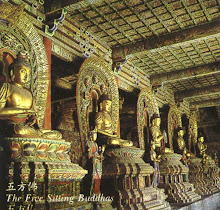OM MANI PADME HUM
Lecture given by Tripitaka
Master Hsuan Hua
Translated by BTTS, USA.
These six characters together make up the Six Character Great Bright Mantra, each one individually is able to emit brilliant light.
The first character is “nan” (Sanskrit: Om). When you recite “nan” (Om) once, all ghosts and spirits must place their palms together. Why do they put their palms together? To maintain the rules and regulations. Conforming to the regulations, they follow the correct way. Recite this one character and all ghosts and spirits do not dare rebel and create confusion; they do not disobey orders. This is the first sound in the Mantra “Mani” (Sanskrit: mani) means ‘silent wisdom.’ Using wisdom one is able to understand all principles, and thus is able to be silently extinguished, without production. It is also defined as ‘separating from filth’, which means leaving all dust and filth. It can be compared to the ‘precious as you will pearl’ which is extremely pure, with no defilement. Whatever excellence you wish to bring forth, ifyou have the ‘precious as-you-will pearl’ it can be done. It can also fulfill your wishes in accord with your thoughts. Every vow you make will be fulfilled. These are its benefits.
“Pa mi” (Sanskrit: padme) actually should read “pa t’e mi”. It means “light perfectly illuminating” and is also defined as ‘the opening of the lotus.’ It is analogous to the wonderful lotus flower which can complete, perfect and fulfill without obstruction. It is the wonderful mind of Avalokitesvara Bodhisattva. This is “pa mi”
Next comes “hung” (Sanskrit: hum) which means “put forth.” Anything at all can be born from this character “hung”. It also means ‘to protect and support.’ Recite this character and all Dharma protectors and good spirits come to support and protect you. It also means ‘eradicating disasters.’ Recite this character and whatever difficulties there are will be eradicated. It also means ‘success’ whatever you cultivate can be accomplished.
Recite the Six Character Great Bright Mantra once, and the immeasurable Buddhas, Bodhisattvas and Vajra Dharmas protecters constantly support and protect you. Therefore, when Avalokitesvara Bodhisattva finished saying this Six Character Great Bright Mantra, seven million Buddhas came to support, protect, and surround him. The strength and ability of the Six Character Great Bright Mantra are inconceivable, the interwining of the response and way unimaginable, therefore it is called the Secret School. If one were to explain in detail, the meanings would be immeasurable and unlimited, they cannot be completely spoken.
Friday, March 28, 2008
The Heart of Prajna Paramita Sutra
When Avalokiteshvara Bodhisattva was practicing the profound Prajna Paramita, he illuminated the five skandhas and saw that they are all empty, and he crossed beyond all suffering and difficulty.
Shariputra, form does not differ from emptiness: emptiness does not differ from form. Form itself is emptiness; emptiness itself is form. So too are feeling, cognition, formation and consciousness.
Shariputra, all dharmas are empty of characteristics. They are not produced, not destroyed, not defiled, not pure and they neither increase nor diminish.
Therefore, in emptiness there is no form, feeling, cognition, formation or consciousness, no eyes, no ears, nose, tongue, body or mind; no sights, sounds, smells, tastes, objects of touch or dharmas, no field of the eyes, up to and including no filed of mind-consciousness; and no ignorance or ending of ignorance, up to and including no old age and death or ending of old age and death. There is no suffering, no accumulating, no extinction, no way and no understanding and no attaining. Because nothing is attained, the Bodhisattva, through reliance on Prajna Paramita, is unimpeded in his mind. Because there is no impediment, he is not afraid, and he leaves distorted dream-thinking far behind. Ultimately Nirvana!
All Buddhas of the three periods of time attain Annutarasamyaksambodhi through reliance on Prajna Paramita. Therefore, know that Prajna Paramita is a great spiritual mantra, a great bright mantra, a supreme mantra, an unequalled mantra. It can remove all suffering; it is genuine and not false. That is why the mantra of Prajna Paramita was spoken. Recite it like this:
Gate Gate Paragate Parasamgate Bodhi Svaha!
MAHA PRAJNA PARAMITA (3 times)
******************
English translation by:
Buddhist Text Translation Society,
Dharma Realm Buddhist University, U.S.A
******************
PRAJNA means wisdom, and PARAMITA means to the other shore. The Bodhisattva Avalokiteshvara cultivates profound Prajna.
The beneficial function of the PRAJNA PARAMITA HEART SUTRA is the eradication of your attachments. In order to cultivate, he (the bodhisattva) relies on the profound wisdom of the Prajna Paramita Dharma. What is obtained through cultivation is the unimpeded mind. We cannot be at ease because we have impediments. If you have no impediments you can be at ease…. That is the kind of power this Sutra has.
Tripitaka Master Hsuan Hua
Commentary to the Prajna Paramita
Heart Sutra.
Shariputra, form does not differ from emptiness: emptiness does not differ from form. Form itself is emptiness; emptiness itself is form. So too are feeling, cognition, formation and consciousness.
Shariputra, all dharmas are empty of characteristics. They are not produced, not destroyed, not defiled, not pure and they neither increase nor diminish.
Therefore, in emptiness there is no form, feeling, cognition, formation or consciousness, no eyes, no ears, nose, tongue, body or mind; no sights, sounds, smells, tastes, objects of touch or dharmas, no field of the eyes, up to and including no filed of mind-consciousness; and no ignorance or ending of ignorance, up to and including no old age and death or ending of old age and death. There is no suffering, no accumulating, no extinction, no way and no understanding and no attaining. Because nothing is attained, the Bodhisattva, through reliance on Prajna Paramita, is unimpeded in his mind. Because there is no impediment, he is not afraid, and he leaves distorted dream-thinking far behind. Ultimately Nirvana!
All Buddhas of the three periods of time attain Annutarasamyaksambodhi through reliance on Prajna Paramita. Therefore, know that Prajna Paramita is a great spiritual mantra, a great bright mantra, a supreme mantra, an unequalled mantra. It can remove all suffering; it is genuine and not false. That is why the mantra of Prajna Paramita was spoken. Recite it like this:
Gate Gate Paragate Parasamgate Bodhi Svaha!
MAHA PRAJNA PARAMITA (3 times)
******************
English translation by:
Buddhist Text Translation Society,
Dharma Realm Buddhist University, U.S.A
******************
PRAJNA means wisdom, and PARAMITA means to the other shore. The Bodhisattva Avalokiteshvara cultivates profound Prajna.
The beneficial function of the PRAJNA PARAMITA HEART SUTRA is the eradication of your attachments. In order to cultivate, he (the bodhisattva) relies on the profound wisdom of the Prajna Paramita Dharma. What is obtained through cultivation is the unimpeded mind. We cannot be at ease because we have impediments. If you have no impediments you can be at ease…. That is the kind of power this Sutra has.
Tripitaka Master Hsuan Hua
Commentary to the Prajna Paramita
Heart Sutra.
Thursday, March 27, 2008
Great Compassion Mantra (continue)
The Chinese Phonetic System (Han-Yu-Pin-Yin) has been adopted to romanise the Chinese texts to serve the needs of devotees, in particular the English speaking Buddhist.
The Great Compassion Heart is vast, great, perfect, full and,
unimpeded in its ability to relieve our suffering and
save us from distress. The Compassion Dharani can
deliver us from suffering.
-The Dharani Sutra-
A devotee was suffering for many days due to a tiny bone lodged in her throat. She was relieved of this unpleasant suffering when she sincerely resolved to reprint the Great Compassion Dharani for free distribution.
The great Compassion Dharani is also known to have healed a cancer patient when his son fervently mantraed a glass of water 108 times for him to drink.
You should know that the reward of blessings
and virtue that accrue to one who accepts
and holds the mantra is inconceivable.
-The Dharani Sutra-
Therefore, devotees should commit to memorize the Great Compassion Heart Dharani. One can conveniently master it by memorizing it line by line. In this way, the whole mantra could be easily remembered and fluently recited. It will become a useful and handy dharma tool which can be put to good use at any time of the day, on any occasion, without any limitation.
To uphold and master the Great Compassion Heart Dharani Dharma-door, one should diligently and sincerely recite this mantra daily. One can recite it 3 times or 5 times, or even 108 times or any number of the times according to one’s convenience and suitability.
.... To recite it a full five times in one evening is to
wipe away your heavy offenses of hundreds, thousands,
tens of thousands of millions of aeons of birth and death.
-The Dharani Sutra-
A thousand eyes observe,
A thousand ears hear all,
A thousand hands help and support
Living beings everywhere.
-Ven. Master Hsuan Hua-
The recollection of one’s thoughts or the concentration or mindfulness one is able to formulate in one’s own mind during one’s recitation is of very great importance. One should single-mindedly perform one’s recitation. A proper understanding of this prerequisite is very essential in order to sincerely maintain a proper frame of mind during the recitation of Sutras and mantras.
As one begins one’s chanting with the Incense Praise or Verse of Salutation to the Triple Jewel, likewise, one should also recite the Verse of Transference as a conclusion to one’s chanting, offerings or performance of meritorious deeds in order to universally share all the merits and virtue accrued there from with all sentient beings throughout the Dharma realms.
“The world is filled with black energy; black karma envelops us. In any place where there are true cultivators, the disasters in that place will be lessened. If many people come together to cultivate, their collective strength can dispel these disasters and counteract the plunders and invisibly eradicate this noxious, evil energy and transform it into harmonious and auspicious energy. But first, both feet must be firmly planted on the ground, and then one must realistically cultivate according to the Buddha’s teachings.
Everyone should bring forth his or her true heart in reciting the Buddha’s name. For every time you recite the Buddha’s name, a ray of light fills up the universe, so that the energy of three thousand great thousand worlds will be auspicious and harmonious and the atmosphere of violence, defilement, and disaster will be dispelled and transformed.”
-Venerable Master Hsuan Hua
Amitabha Buddha Recitation
Session, 1980
E MI TUO FO
The Great Compassion Heart is vast, great, perfect, full and,
unimpeded in its ability to relieve our suffering and
save us from distress. The Compassion Dharani can
deliver us from suffering.
-The Dharani Sutra-
A devotee was suffering for many days due to a tiny bone lodged in her throat. She was relieved of this unpleasant suffering when she sincerely resolved to reprint the Great Compassion Dharani for free distribution.
The great Compassion Dharani is also known to have healed a cancer patient when his son fervently mantraed a glass of water 108 times for him to drink.
You should know that the reward of blessings
and virtue that accrue to one who accepts
and holds the mantra is inconceivable.
-The Dharani Sutra-
Therefore, devotees should commit to memorize the Great Compassion Heart Dharani. One can conveniently master it by memorizing it line by line. In this way, the whole mantra could be easily remembered and fluently recited. It will become a useful and handy dharma tool which can be put to good use at any time of the day, on any occasion, without any limitation.
To uphold and master the Great Compassion Heart Dharani Dharma-door, one should diligently and sincerely recite this mantra daily. One can recite it 3 times or 5 times, or even 108 times or any number of the times according to one’s convenience and suitability.
.... To recite it a full five times in one evening is to
wipe away your heavy offenses of hundreds, thousands,
tens of thousands of millions of aeons of birth and death.
-The Dharani Sutra-
A thousand eyes observe,
A thousand ears hear all,
A thousand hands help and support
Living beings everywhere.
-Ven. Master Hsuan Hua-
The recollection of one’s thoughts or the concentration or mindfulness one is able to formulate in one’s own mind during one’s recitation is of very great importance. One should single-mindedly perform one’s recitation. A proper understanding of this prerequisite is very essential in order to sincerely maintain a proper frame of mind during the recitation of Sutras and mantras.
As one begins one’s chanting with the Incense Praise or Verse of Salutation to the Triple Jewel, likewise, one should also recite the Verse of Transference as a conclusion to one’s chanting, offerings or performance of meritorious deeds in order to universally share all the merits and virtue accrued there from with all sentient beings throughout the Dharma realms.
“The world is filled with black energy; black karma envelops us. In any place where there are true cultivators, the disasters in that place will be lessened. If many people come together to cultivate, their collective strength can dispel these disasters and counteract the plunders and invisibly eradicate this noxious, evil energy and transform it into harmonious and auspicious energy. But first, both feet must be firmly planted on the ground, and then one must realistically cultivate according to the Buddha’s teachings.
Everyone should bring forth his or her true heart in reciting the Buddha’s name. For every time you recite the Buddha’s name, a ray of light fills up the universe, so that the energy of three thousand great thousand worlds will be auspicious and harmonious and the atmosphere of violence, defilement, and disaster will be dispelled and transformed.”
-Venerable Master Hsuan Hua
Amitabha Buddha Recitation
Session, 1980
E MI TUO FO
Wednesday, March 26, 2008
Great Compassion Mantra
Xiang Zan
INCENSE PRAISE
lu xiang zha ruo;
fa jie meng xun;
zhu fohai hui xi yao wen;
sui chu jie xiang yun;
cheng yi fang yin;
zhu fo xian quan shen;
na mo xiang yun gai pu sa mo he sa.
INCENSE PRAISE
The censor’s incense is lit, the fragrance
Pervading the Dharma realm;
The vast assembly of all Buddhas inhale it
from afar;
Everywhere auspicious clouds are gathering;
With earnest sincerity;
May all Buddhas manifest;
Homage to the Bodhisattvas and Mahasattvas
of the incense-cloud canopy.
Qian shou qian yan guan shi yin pu sa
guang da yuan man wu ai da bei xin tuo luo ni
The vast, perfect, unimpeded Great Compassion Heart Dharani
of the thousand-hands, thousand-eyes Bodhisattva Regarder of
World Sound (recite once)
Na mo da bei guan shi yin pu sa
Homage to the Great Compasssionate Bodhisattva Regarder
of World Sounds.
(Recite three times. Then recite the Great Compassion Mantra)
da bei zhou
Great Compassion Mantra
1. na mo he la da nuo; duo la ye ye
2. na mo e li ye
3. po lu jie di; shuo bo la ye
4. pu ti sa duo po ye
5. mo he sa duo po ye
6. mo he jia lu ni jia ye
7. an
8. sa pan la fa yi
9. shu da nuo da xie
10. na mo xi ji li duo yi meng e li ye
11. po lu ji di . shi fo la leng tuo po
12. na mo nuo la jin chi
13. xi li mo he pan duo sha mi
14. sa po e tuo dou shu peng
15. e shi yun
16. sa po sa duo . na mo po sa duo . na mo po qie
17. mo fa te dou
18. da zi tuo
19. an e po lu xi
20. lu jia di
21. jia luo di
22. yi xi li
23. mo he pu ti sa duo
24. sa po sa po
25. mo la mo la
26. mo xi mo xi li tuo yun
27. ju lu ju lu jie meng
28. du lu du lu fa she ye di
29. mo he fa she ye di
30. tuo la tuo la
31. di li ni
32. shi fo la ye
33. zhe la zhe la
34. mo mo fa mo la
35. mu di li
36. yi xi yi xi
37. shi nuo shi nuo;
38. e la shen . fo la she li
39. fa sha fa shen
40. fo la she ye
41. hu lu hu lu mo la
42. hu lu hu lu xi li
43. suo la suo la
44. xi li xi li
45. su lu su lu
46. pu ti ye . pu ti ye
47. pu tuo ye pu tuo ye
48. mi di li ye
49. nuo la jin chi
50. di li se ni nuo
51. po ye mo nuo
52. suo po he
53. xi tuo ye
54. suo po he
55. mo he xi tuo ye
56. suo po he
57. xi tuo yu yi
58. shi pan la ye
59. suo po he
60. nou la jin chi
61. suo po he
62. mo la nuo la
63. suo po he
64. xi la seng e mo qu ye
65. suo po he
66. suo po mo he e xi tuo ye
67. suo po he
68. zhe ji la e xi tuo ye
69. suo po he
70. bo tuo mo jie xi tuo ye
71. suo po he
72. nuo la jin chi pan qie la ye
73. suo po he
74. mo po li sheng jie la ye
75. suo po he
76. na mo he la da nuo duo la ye ye
77. na mo e li ye
78. po lu ji di
79. shuo pan la ye
80. suo po he
81. an; xi dian du
82. man duo la
83. ba tuo ye
84. suo po he
The Great Compassion Mantra
(in Sanskrit)
Namo Aryavalokitesvaraya Bodhisattva Mahasattva Mahakarunakaya (recite 3 times)
*Namo ratnatrayaya / Namo aryavalokisvaraya / Bodhisattvaya / mahasattvaya / mahakarunikaya / arayavokitesvaragarbha / Namo nilakantha / [Siri] mahabhadrasrame / Sarvarthasubham / ajeyam / sarvasattvanamavarga / mahadhatu / Tadyatha / Om avaloke / lokite / kalate / Hari / mahabodhisattva /sarva sarva / mala mala / [Masi] Mahahrdayam / kuru kuru karmam / [Kuru] Kuruvijayati / mahavijayati / Dharadhara / dharin suraya / Chala chala / mama bhramara / muktir / Ehi ehi / chinda chinda / harsam prachali / Basa basam presaya / hulu hulu mala / Hulu hulu hilo / sara sara / siri siri / suru suru / Bodhiya bodhiya / bodhaya bodhaya / Maitreya / nilakantha / dharsinina / Payamana svaha / siddhaya svaha / mahasiddhaya svaha /Siddhayogesvaraya svaha / nilakanthasvaha / Varahananaya svaha / simhasiramukhaya svaha / Sarvamahasiddhaya svaha / cakrasiddhaya svaha / Padmahastaya svaha / nilakanthavikaraya svaha / Maharsisankaraya svaha / Namo ratnatrayaya / Namo aryavalokitesvaraya svaha / Om siddhyantu / mantrapadaya svaha.
* Extract from:- Buddhist Puja
INCENSE PRAISE
lu xiang zha ruo;
fa jie meng xun;
zhu fohai hui xi yao wen;
sui chu jie xiang yun;
cheng yi fang yin;
zhu fo xian quan shen;
na mo xiang yun gai pu sa mo he sa.
INCENSE PRAISE
The censor’s incense is lit, the fragrance
Pervading the Dharma realm;
The vast assembly of all Buddhas inhale it
from afar;
Everywhere auspicious clouds are gathering;
With earnest sincerity;
May all Buddhas manifest;
Homage to the Bodhisattvas and Mahasattvas
of the incense-cloud canopy.
Qian shou qian yan guan shi yin pu sa
guang da yuan man wu ai da bei xin tuo luo ni
The vast, perfect, unimpeded Great Compassion Heart Dharani
of the thousand-hands, thousand-eyes Bodhisattva Regarder of
World Sound (recite once)
Na mo da bei guan shi yin pu sa
Homage to the Great Compasssionate Bodhisattva Regarder
of World Sounds.
(Recite three times. Then recite the Great Compassion Mantra)
da bei zhou
Great Compassion Mantra
1. na mo he la da nuo; duo la ye ye
2. na mo e li ye
3. po lu jie di; shuo bo la ye
4. pu ti sa duo po ye
5. mo he sa duo po ye
6. mo he jia lu ni jia ye
7. an
8. sa pan la fa yi
9. shu da nuo da xie
10. na mo xi ji li duo yi meng e li ye
11. po lu ji di . shi fo la leng tuo po
12. na mo nuo la jin chi
13. xi li mo he pan duo sha mi
14. sa po e tuo dou shu peng
15. e shi yun
16. sa po sa duo . na mo po sa duo . na mo po qie
17. mo fa te dou
18. da zi tuo
19. an e po lu xi
20. lu jia di
21. jia luo di
22. yi xi li
23. mo he pu ti sa duo
24. sa po sa po
25. mo la mo la
26. mo xi mo xi li tuo yun
27. ju lu ju lu jie meng
28. du lu du lu fa she ye di
29. mo he fa she ye di
30. tuo la tuo la
31. di li ni
32. shi fo la ye
33. zhe la zhe la
34. mo mo fa mo la
35. mu di li
36. yi xi yi xi
37. shi nuo shi nuo;
38. e la shen . fo la she li
39. fa sha fa shen
40. fo la she ye
41. hu lu hu lu mo la
42. hu lu hu lu xi li
43. suo la suo la
44. xi li xi li
45. su lu su lu
46. pu ti ye . pu ti ye
47. pu tuo ye pu tuo ye
48. mi di li ye
49. nuo la jin chi
50. di li se ni nuo
51. po ye mo nuo
52. suo po he
53. xi tuo ye
54. suo po he
55. mo he xi tuo ye
56. suo po he
57. xi tuo yu yi
58. shi pan la ye
59. suo po he
60. nou la jin chi
61. suo po he
62. mo la nuo la
63. suo po he
64. xi la seng e mo qu ye
65. suo po he
66. suo po mo he e xi tuo ye
67. suo po he
68. zhe ji la e xi tuo ye
69. suo po he
70. bo tuo mo jie xi tuo ye
71. suo po he
72. nuo la jin chi pan qie la ye
73. suo po he
74. mo po li sheng jie la ye
75. suo po he
76. na mo he la da nuo duo la ye ye
77. na mo e li ye
78. po lu ji di
79. shuo pan la ye
80. suo po he
81. an; xi dian du
82. man duo la
83. ba tuo ye
84. suo po he
The Great Compassion Mantra
(in Sanskrit)
Namo Aryavalokitesvaraya Bodhisattva Mahasattva Mahakarunakaya (recite 3 times)
*Namo ratnatrayaya / Namo aryavalokisvaraya / Bodhisattvaya / mahasattvaya / mahakarunikaya / arayavokitesvaragarbha / Namo nilakantha / [Siri] mahabhadrasrame / Sarvarthasubham / ajeyam / sarvasattvanamavarga / mahadhatu / Tadyatha / Om avaloke / lokite / kalate / Hari / mahabodhisattva /sarva sarva / mala mala / [Masi] Mahahrdayam / kuru kuru karmam / [Kuru] Kuruvijayati / mahavijayati / Dharadhara / dharin suraya / Chala chala / mama bhramara / muktir / Ehi ehi / chinda chinda / harsam prachali / Basa basam presaya / hulu hulu mala / Hulu hulu hilo / sara sara / siri siri / suru suru / Bodhiya bodhiya / bodhaya bodhaya / Maitreya / nilakantha / dharsinina / Payamana svaha / siddhaya svaha / mahasiddhaya svaha /Siddhayogesvaraya svaha / nilakanthasvaha / Varahananaya svaha / simhasiramukhaya svaha / Sarvamahasiddhaya svaha / cakrasiddhaya svaha / Padmahastaya svaha / nilakanthavikaraya svaha / Maharsisankaraya svaha / Namo ratnatrayaya / Namo aryavalokitesvaraya svaha / Om siddhyantu / mantrapadaya svaha.
* Extract from:- Buddhist Puja
Subscribe to:
Comments (Atom)











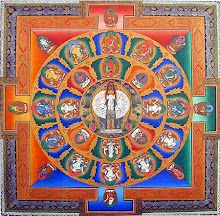




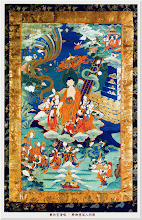

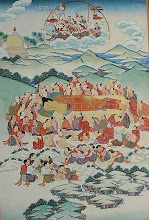


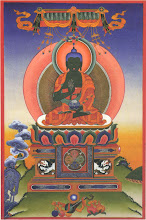




.jpg)

